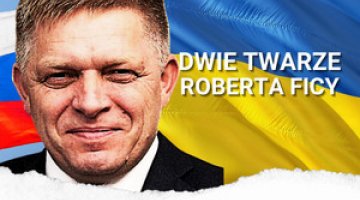‘Dr Fico and Mr Hyde’: Slovakia’s game with Ukraine and Russia
On 7 October, Slovak-Ukrainian intergovernmental consultations were held near Uzhhorod, in the Zakarpattia Oblast. During the meeting, the two sides reviewed the progress of the projects outlined in the so-called roadmap, which had been adopted at a similar session last April. Prime Minister Robert Fico assured Ukraine of Slovakia’s “unconditional” support for its aspirations to join the European Union, although he distanced himself from its NATO ambitions. He described the level of political dialogue between the two countries as “the best ever” and pledged continued support for Ukraine, including military assistance – but no “lethal” aid. Prime Minister Denys Shmyhal expressed gratitude to Fico for this gesture and highlighted the concept of a “new pragmatism” in bilateral relations, based on continuing dialogue and seeking to align their actions despite differences on key issues (see ‘Shmyhal: Slovakia’s two-track Ukraine policy‘). The next meeting in this format is scheduled to be held in Slovakia in January or February 2025.
Speaking at the 80th anniversary of the Battle of the Dukla Pass the previous day, Fico declared that “if such an opportunity arises for government representatives in 2025”, he would like to participate in the 80th anniversary celebrations of the end of the Second World War in Moscow. He added that this would be a gesture of respect and gratitude towards the Red Army for liberating his country, as “freedom came to Slovakia from the East.” On the same day, he gave an interview in which he stated that as long as he is prime minister, he will urge his party’s MPs to “never agree to Ukraine’s membership in NATO as this would mean the outbreak of the Third World War.”
On the one hand, Fico’s two-track policy is designed to reinforce his message to the domestic electorate, where pro-Russian sentiments are widespread, and remains primarily rhetorical. On the other hand, the prime minister wants to signal to the outside world that he remains a pragmatic politician. He likely hopes that by presenting a constructive approach towards Ukraine, he can achieve key objectives within the EU, including avoiding the suspension of EU funds due to rule-of-law issues, while retaining the freedom to pursue controversial reforms domestically.
Commentary
- Despite its numerous pro-Russian gestures, Slovakia has maintained its support for Ukraine, which explains Ukraine’s pragmatic approach to relations with its neighbour. Prime Minister Shmyhal stated that Slovakia has been the second-largest supplier of electricity to Ukraine, including on a commercial basis, in recent months (following Hungary). In addition to this support, two facilities operating in eastern Slovakia have been repairing Ukrainian military equipment. Slovakia has also been supplying significant amounts of 155 mm artillery ammunition commercially; the production capacity of its three plants (where state-owned companies also hold a stake) has been steadily increasing, and their 2024 output is on track to reach 150,000 rounds. Meanwhile, the state-owned company DMD, specifically its subsidiary Konštrukta – Defence, is in the process of implementing earlier contracts for Zuzana 2 howitzers (see ‘Slovakia to deliver howitzers to Ukraine – Denmark, Germany and Norway are paying‘). The average monthly value of military supplies under Fico’s government is higher than under the previous caretaker government of Ľudovít Ódor; however, most of these deliveries have been conducted on a commercial basis.
- At the rhetorical level, Slovakia is pursuing a multi-vector foreign policy aimed at its domestic constituency, but on key issues, it remains aligned with the mainstream of the EU and NATO. In line with NATO targets, Slovakia has achieved defence spending of 2% of its GDP, largely as a result of major contracts with the United States. The Slovakian government’s overt efforts to strengthen its ties with Ukraine may be seen as an attempt to distance itself from Hungary, which has been ostracised in the EU due to its close relations with the Kremlin. By acting as an advocate for Ukraine (for example, Fico announced that Slovakia would submit a proposal in Brussels to provide systemic support to Ukraine in ensuring electricity supplies), the government in Bratislava is strengthening its position on the European stage as it seeks to reduce the risk of being drawn into disputes over the rule of law.
- Fico’s pro-Russian remarks are part of a strategy aimed at maintaining support from his electorate, which harbours relatively strong sympathies for Russia (see ‘Slovakia: strategic dilemmas after the Russian invasion of Ukraine’). To date, this tactic has proven effective: his party, the left-wing nationalist Smer, has consistently topped the polls since spring 2023. Smer’s voters exhibit stronger-than-usual sympathy for the Kremlin’s actions, even by Slovak standards: 35% of them want Russia to win the ongoing war, while only 5% support Ukraine (according to an Ipsos survey from last May). Therefore, expressions of scepticism towards Ukraine’s NATO membership bid appeal to them. Such statements come at relatively little cost to Slovakia as there is currently no consensus on this issue within NATO. Should the US and Germany agree to support Ukraine’s entry into the Alliance, the government in Bratislava would likely align itself with the majority view.




